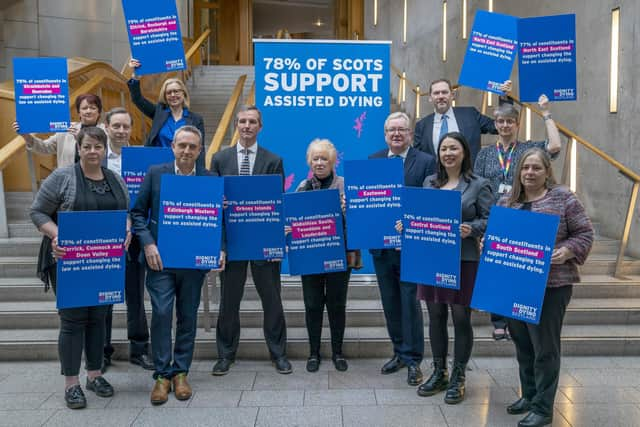Assisted dying ‘cannot come soon enough’ for terminally ill, says MSP behind Bill
Legalising assisted dying in Scotland “cannot come soon enough” for those with terminal illnesses, the MSP behind new legislation has said.
But Liam McArthur warned a “painstaking process” lies ahead to ensure the plans are properly scrutinised in the Scottish Parliament.
Advertisement
Hide AdAdvertisement
Hide AdHe said he is “confident” Holyrood will back his legislation, adding “robust safeguards” are included in the Bill.


It came as a poll found more than three-quarters of Scots are in favour of assisted dying legislation.
A survey by campaign group Dignity in Dying found at least a two-thirds majority in every constituency and region in Scotland, with a 78 per cent average overall support.
The proposals would give people over the age of 16 with an advanced terminal illness the option of requesting an assisted death.
They would have to have the mental capacity to make such a request, which would have to be made voluntarily without them being coerced.
Two doctors would have to be satisfied of the patient’s condition, and also that they have not been pressurised into their decision.
Only people who have lived in Scotland for at least a year would be allowed to make such a request. The Bill also sets out a mandatory 14-day “reflection” period between a qualifying patient making a request and being given the necessary medication.
At this point, a medical professional would make a final check on the patient’s capacity.
Advertisement
Hide AdAdvertisement
Hide AdOpponents fear the plans could see the lives of people who are ill or disabled “devalued”, with the Bishop of Paisley John Keenan branding it a “dangerous idea”.
It is the third time MSPs have considered the issue, with two previous attempts to change the law overwhelmingly defeated.
Mr McArthur, a Liberal Democrat, said: “This Bill contains robust safeguards, similar to those which have been safely and successfully introduced in countries such as Australia, New Zealand and the United States, where they continue to enjoy strong public support.
“Our current laws on assisted dying are failing too many terminally ill Scots at the end of life. Too often, and despite the best efforts of palliative care, dying people are facing traumatic deaths that harm both them and those they leave behind.
“Polling has consistently shown overwhelming public support for assisted dying, and now I believe that politicians are catching up with where the public has been for some time.”
Speaking to journalists, he said the issue “cuts across party political divides”, adding: “I’m confident that political mood is shifting.”
He said he was “very encouraged” by recent comments by Sir Keir Starmer and Prime Minister Rishi Sunak, who has promised to allow time for similar legislation in Westminster.
Mr McArthur said: "I think that shows the shift in the political mood, it shows, I think, the momentum behind the case for change. They’ll need to go through a process of consultation and the development of a Bill. I’m already a good deal further forward with that process.”
Advertisement
Hide AdAdvertisement
Hide AdHe said it is “perfectly achievable” for Scotland to pass legislation before the rest of the UK, but added: “In a sense it’s not a race. I understand the urgency, because particularly for those with a terminal illness, this change in the law cannot come soon enough.
"But each legislator will need to properly consult and scrutinise the legislation to make sure they get the detail of that right. That’s a painstaking process that lies ahead for my MSP colleagues.”
The Orkney MSP said assisted dying “feels like the next great liberal reform”, adding: “I think I’m on the record as saying that once we pass this legislation, we’ll wonder why on earth it took us so long to do so.”
But Bishop Keenan said: “Liam McArthur has today published a damaging Bill which attacks human dignity and introduces a dangerous idea that a citizen can lose their value and worth.
“Assisted suicide sends a message that there are situations when suicide is an appropriate response to one’s individual circumstances, worries, anxieties. It normalises suicide and accepts that some people are beyond hope.
“Furthermore, assisted suicide undermines trust in doctors and damages the doctor-patient relationship. In countries where assisted suicide is legal, there is evidence that vulnerable people, including the elderly and disabled, experience external pressure to end their lives.”
Dr Gillian Wright, a former palliative care registrar who is part of the Our Duty of Care campaign, also spoke out against the proposals.
She said: “The primary danger of assisted suicide is that individual lives are devalued by society because they are ill, disabled, confused, or that their contribution to society is perceived to be minimal. We are encouraged that ordinary doctors and nurses from across Scotland have joined together to send a definite message to MSPs.
Advertisement
Hide AdAdvertisement
Hide Ad“We do understand that there is suffering at the end of life, but this should drive us as a society not to provide assisted suicide, but instead well-funded, accessible, high-quality palliative care for all.”
Former MP and MSP Dennis Canavan, who has seen three of his children die from terminal illnesses, urged Holyrood to vote against the Bill.
He said: “I have probably had more than my fair share of deaths in my family, having suffered the loss of four children, three of them as the result of terminal illness.
“My children undoubtedly underwent some pain, but it was minimised by caring health professionals. As a result, my children died in dignity and I do not accept that the option of assisted suicide is necessary to ensure dignity in death.”
Comments
Want to join the conversation? Please or to comment on this article.
